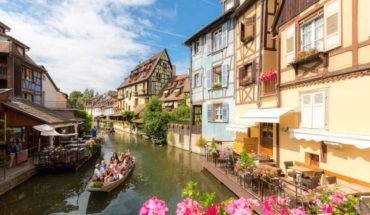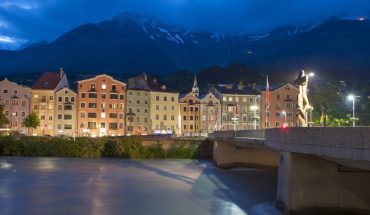Imagine a Frenchman; the most stereotypical Frenchman you can think of. Don’t worry about being rude or un-PC. This is a game. Thought of something? Ok. Are you picturing a man with a beret? Wearing a striped shirt? On a bike? With onions round his neck?Congratulations, you’re a racist.
I’m joking, of course. You’re not a racist. You’re merely imagining the clichéd image of the French that has lingered in British culture for decades. But the image you’re thinking of is real. These people exist. At least, they did at one point. You probably never saw them, but your grandparents did. These were the ‘Onion Johnnies’ – travelling onion sellers that came over to Britain and sold their produce door-to-door.
Rocks off in Roscoff: Float Your Boat
What has any of this got to do with Roscoff? That was their home port. These intrepid vegetable floggers are an important part of the town’s heritage, and just one of the little things you never knew about this port settlement a stone’s throw across the Channel.
Roscoff is a little town with a big history, from the beret-and-baguette images of the Onion Johnnies to the naval adventures that come with being a busy 16th and 17th Century port. Most people think of it as somewhere to stop off for a few hours before or after a journey crossing the sea with Direct Ferries. But this is a mistake.
I spent a few days in Roscoff recently. I didn’t push on to Paris or the Loire Valley or any other popular French destination. No, I stayed in Roscoff. And I had a great time. It’s a lovely little place, and has a few little side trips up its sleeve, too. Of course, if you time things perfectly, you can catch the annual Onion Festival in August. Realistically, however, you are probably going to miss the boat – although hopefully not literally.
I arrived by ferry, as many people do. I discovered a pretty Brittany harbour town with a lot to offer not only a day tripper, but a long weekend visitor. I was actually there Tuesday to Friday, but you get the idea.
Rocks off in Roscoff: Explore the Town
The first thing to do is explore. Roscoff is compact, and feels like it was built to be this quaint little tourist town. Except no one thinks Roscoff actually is a tourist town. Which means if you come here as a tourist, you are winning.
Check out the harbour, pop in the church and wander the town. Dating from the 16th Century, the parish church Notre Dame de Croaz Batz is quite a sight. Its architectural roots lie in the influences of Renaissance and Gothic design. That’s not exactly a unique claim, but it’s striking and absorbing. Elsewhere, the clock tower is pretty impressive. It’s not Back to the Future clock tower impressive, but still, it’s nice. It’s ornate. It’s a clock tower.
If you’re in the mood to get out of Roscoff for a bit jump on a 15-minute ferry to the lle-de-Batz. It’s a small island where residents grow organic vegetables and fish. The island is only two miles long, so a few hours can cover everything. If you’re in the mood for mild humidity, you can drop into the Georges Delaselle subtropical gardens. If you want a more windswept and autumnal experience, amble north towards the heathland, grassy dunes and sandy beaches.
Rocks off in Roscoff: Food for Thought
Back in town there are a number of options for lunch. Crepes are definitely rocking in Roscoff, and a favourite is Crêperie-de-la-Poste. The restaurant is on the bottom floor of a delightful three-story granite-built townhouse, the dining room is snug and friendly and the kitchen does a serious ham and egg crepe.
In terms of dinner, Roscoff has some great little bistros cooking up solid, tasty and authentic home-grown flavours. A top suggestion for dining out is Les 3 Crevettes. It’s a simple, traditional brasserie that serves up tasty and unpretentious fare. It’s cosy inside, but is a well-respected restaurant and heavily visited by locals. Seafood is the order of the day, with a regularly changing menu. Platters of mussels, oysters and prawns are popular and rather tasty.
Roscoff is just six hours from Plymouth by ferry, and highly recommended. Whether you’re heading to there for food, walks, history or architecture, a visit across the Channel to this Brittany port is not just a means to an end; it’s a place with enough going for it to justify a trip on its own terms.


